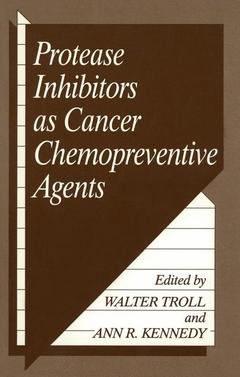Protease Inhibitors as Cancer Chemopreventive Agents, Softcover reprint of the original 1st ed. 1993
Langue : Anglais
Coordonnateurs : Kennedy A.R., Troll W.

Protease inhibitors (PIs) are widely distributed in plants and animals, and have a variety of functions, which include preventing digestion of seeds by insects and modifying blood clotting in animals. After it was noted that synthetic and natural inhibitors suppress two-stage carcinogenesis and breast cancer, extensive work investigating PIs as chemopreventive agents was started. PIs are unique in that they interfere with cancer development in a variety of ways, including suppression of oxygen radicals, oncogenes, and metastases. Epidemiologic evidence supports their prevention of major human cancers in populations that consume foods containing them. Their supervised use in humans is on the threshold of development. The epidemiologic discovery of the importance of lentils and other seeds rich in PIs in preventing many human cancers allowed us to look at the action of PIs as chemopreventive agents, as reviewed in Chapter I (Fontham and Correa). Chapter 2 (Kennedy) discusses the role of natural PIs (e. g. , the Bowman-Birk inhibitor) as anticarcinogens and the possible limitations of their use. In Chapter 3 (Kennedy), the transformation of C3HI lOTlh cells caused by carcinogens and promoters is shown to be suppressed by PIs. Bowman (Chapter 4) relates the discovery of inhibitors in soybeans that are distinct from the Kunitz inhibitor, and the occurrence of a similar inhibitor in peanuts and other legumes. Chapter 5 (Birk) is an overview of PIs of plant origin and their role in human nutrition.
1 The Epidemiologic Approach to the Study of Protease Inhibitors.- 2 Anticarcinogenic Activity of Protease Inhibitors: Overview.- 3 In Vitro Studies of Anticarcinogenic Protease Inhibitors.- 4 Discovery and Background of the Bowman-Birk Protease Inhibitors.- 5 Protease Inhibitors of Plant Origin and Role of Protease Inhibitors in Human Nutrition: Overview.- 6 Antigenicity of Soybean Protease Inhibitors.- 7 Low-Molecular-Weight Protease Inhibitors of Microbial Origin.- 8 Protease Inhibitor Synthesis by MCF-7 Breast Cancer Cells.- 9 Analysis of Structure-Activity Relationships of the Bowman-Birk Inhibitor of Serine Proteinases: Toward a Rational Design of New Cancer Chemopreventive Agents.- 10 Prevention of Cancer by Vitamin B3 (Nicotinamide and Nicotinic Acid): A Protease Inhibitor Available in Pure Form.- 11 Approaches to Studying the Target Enzymes of Anticarcinogenic Protease Inhibitors.- 12 Anticarcinogenic Activities of Naturally Occurring Cysteine Proteinase Inhibitors.- 13 Cell Membrane Enzymes Containing Chymotrypsin-like Activity.- 14 The Role of Reactive Oxygen Species in Biological Damage and the Effect of Some Chemopreventive Agents.- 15 Protease Inhibitor Suppression of ras Oncogene-lnduced Transformation.- 16 Suppression of c-myc by Anticarcinogenic Protease Inhibitors.- 17 A Role for Esterases in Steroid Hormone Turnover.- 18 Protease Inhibitors and Pancreatic Carcinogenesis.
Date de parution : 10-2012
Ouvrage de 315 p.
15.5x23.5 cm
Thèmes de Protease Inhibitors as Cancer Chemopreventive Agents :
Mots-clés :
carcinogenesis; cell; cell membrane; enzymes; prevention; synthesis
© 2024 LAVOISIER S.A.S.



